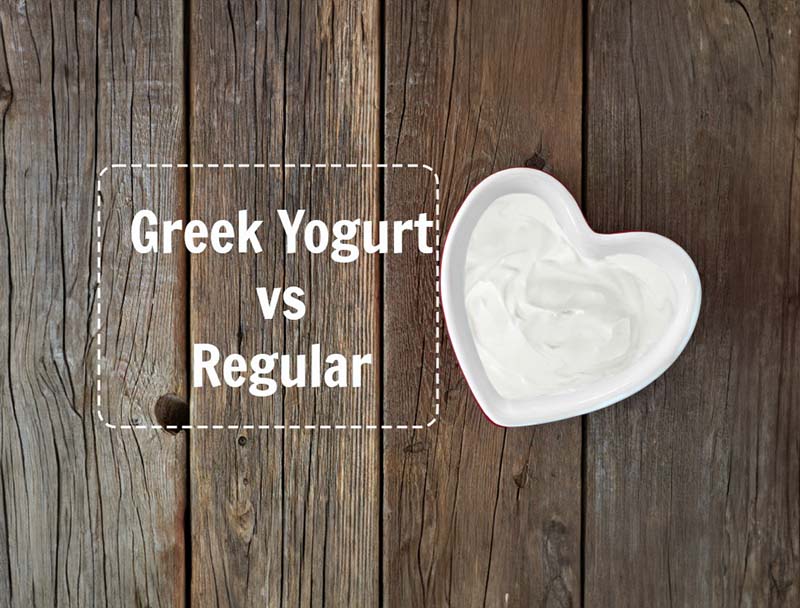Greek yogurt has become a popular choice for those looking to manage their weight, prompting the question: ‘Is Greek Yogurt Good for Weight Loss?’ Understanding the unique characteristics of Greek yogurt is essential in addressing this query. So, what exactly is Greek yogurt, and how is it different from regular yogurt? More importantly, how can it contribute to weight loss? Let’s explore these aspects to reveal the role of Greek yogurt in effective weight management.
Is Greek Yogurt Good for Weight Loss?
Greek yogurt, famed for its dense protein content, emerges as a stellar choice in the realm of weight management. The prominence of protein, the most filling of all macronutrients, is central here. By integrating protein-laden foods like Greek yogurt into your diet, you’re paving the way for prolonged satiety. This lasting fullness can lead to a decrease in overall calorie consumption, as the urge to indulge in less satisfying snacks diminishes. Does Greek yogurt help you lose weight? Yes, due to its high protein content.
Delving into the research, a comprehensive review encompassing 22 studies highlighted a fascinating correlation. Regular yogurt consumption is associated with reduced body fat, lesser weight gain, and a trimmer waistline. Given that Greek yogurt boasts an even higher protein content than its regular counterpart, its potential as a weight management ally is considerably amplified.
Nonetheless, it’s essential to recognize that Greek yogurt is just one piece of the puzzle. For sustained weight control, it’s imperative to embed Greek yogurt within a well-rounded diet and adhere to wholesome lifestyle habits. This holistic approach is key to achieving and maintaining a healthy body weight.

10 Reasons Why Greek Yogurt Is Great for Weight Loss
Rich in Protein
Increasing our daily protein intake and distributing it evenly throughout the day is essential for optimal health. Many of us tend to consume the bulk of our protein during lunch or dinner, but spreading it out is more beneficial. Individual protein needs vary, but a common guideline suggests 8 grams per kilogram of body weight. However, it’s not unusual for some to target over 100 grams daily.
Greek yogurt is an excellent choice to meet these protein goals. It surpasses regular yogurt in protein content, with some studies indicating it has up to four times more protein.
A single 6 to 7 ounce serving of Greek yogurt can provide 18 to 20 grams of protein. Striving for 20 to 30 grams per meal can aid in feeling full and maintaining stable blood sugar levels. Research has demonstrated that consuming high-protein Greek yogurt enhances strength, muscle size, and lean body mass, particularly when combined with a 12-week resistance-training regimen.
Protein is crucial for satiety, helping to reduce the intake of less nutritious, calorie-dense foods. Maintaining a steady intake of protein throughout the day supports muscle health and weight management. Diets high in protein are also known to increase metabolic rates.
Low in Carbohydrates
The benefits of eating less carbs are straightforward and well-known. Carbs are mainly sugars and starches found in processed foods, which our bodies use for energy. If you’re trying to cut down on carbs, Greek yogurt is a great choice. It’s much lower in carbs than regular yogurt, with only 5-8 grams per serving compared to 13-17 grams in regular yogurt.
Tip: Choose plain Greek yogurt without added preservatives or flavors. You can make it tastier by adding things like chia seeds, pumpkin seeds, berries, fresh fruit, flaxseed, cinnamon, natural sweeteners like stevia or honey, and granola at home. This way, you keep your carb intake low and get to enjoy a delicious, filling snack or part of a meal.

Anti-Inflammatory Properties
Many people worry that dairy products might cause inflammation, but Greek yogurt is different. Research shows that Greek yogurt is good for you because it has special types of bacteria called probiotics, especially one called Lactobacillus. These probiotics help reduce inflammation in your body. Basically, they fight off bad microbes in your stomach that can cause inflammation. Keeping your stomach healthy is really important for your overall health.
Note: If you’re concerned about inflammation but still want the benefits of dairy, Greek yogurt is a good choice. It not only helps keep your stomach healthy but also helps in reducing inflammation in your body, making it a smart choice for staying healthy.
Dairy Alternative for Lactose Intolerance
Greek yogurt is a fantastic option for those looking for foods low in carbohydrates and lactose. It’s perfect for people who have trouble digesting lactose, the sugar found in milk. Unlike many dairy products, Greek yogurt is easier on the stomach and doesn’t cause the usual discomforts. It’s rich in important nutrients like calcium and vitamin D, which are vital for bone health.
The bonus is that Greek yogurt can also help with digestive problems that often come from eating dairy. It does this in a natural way, acting as a barrier against harmful microbes and aiding in weight loss efforts.
Note: For those who are lactose intolerant or sensitive, Greek yogurt is an excellent dairy alternative. It allows you to enjoy the benefits of dairy without the usual digestive issues. Plus, its high nutrient content makes it a healthy choice for maintaining strong bones and a balanced diet.
Low Glycemic Index
The Glycemic Index (GI) is a way to measure how different foods with carbs affect blood sugar levels. Foods with a GI of 55 or lower are better because they don’t cause a quick spike in blood sugar. Greek yogurt has a very low GI score, between 6 and 11 out of 100, making it a great choice for people trying to control blood pressure, diabetes, or lose weight. Eating foods with a low GI helps keep blood sugar and insulin levels steady, which can prevent gaining extra body fat.
Diets with a lot of simple carbs can lead to problems like insulin resistance and trouble controlling blood sugar. Eating Greek yogurt regularly can help avoid these issues, reducing the risk of obesity, diabetes, and heart diseases. It’s important to have carbs in our diet, but not all carbs are the same in how they affect our health.
In terms of Greek yogurt and insulin, even though it causes a higher insulin response than its GI would suggest, it’s still within the range of other low-GI, non-dairy foods. The insulin response from Greek yogurt is similar to that from meals with non-dairy protein. Since Greek yogurt has a lower GI than many carb foods, using it instead of other protein and carb sources can help lower the overall GI and glycemic load of your diet. This fits with dietary recommendations that include whole grains, fruits, vegetables, nuts, legumes, fish, vegetable oils, and yogurt.
Note: For those watching their blood sugar or dealing with diabetes, Greek yogurt is a smart addition to your diet. It’s a lower GI option compared to other carb sources, helping you maintain a balanced and healthy diet.
Promotes Healthy Bowel Movements
Understanding what your bowel movements are telling you is important for your health. Many people suffer from issues like diarrhea, bloating, and stomach cramps. These problems are often caused by not eating right and not getting enough good bacteria in your gut.
Greek yogurt is really helpful for these stomach problems. It’s full of good bacteria that help your digestion. Eating Greek yogurt can make your stomach feel better and help with problems like constipation, especially after taking antibiotics. Antibiotics can mess up your stomach, making it hard to go to the bathroom. Eating Greek yogurt when you’re on antibiotics can help fix this.
Tips:
- Try Different Probiotic Foods: Along with Greek yogurt, eating foods like kefir, sauerkraut, and miso can also be good for your stomach.
- Choose the Right Yogurt: Look for Greek yogurt with live bacteria and not much sugar.
- Eat Foods with Fiber: Foods like whole grains, fruits, and vegetables help your digestion and work well with the good bacteria from the yogurt.
Alleviates Seasonal Allergy Effects
Probiotics are really helpful for fighting off the annoying symptoms of hay fever, like a runny nose, sneezing, and watery eyes. These symptoms happen because your body makes something called Immunoglobulin E (IgE), which causes allergic reactions. Eating Greek yogurt, which has a lot of good bacteria, can help reduce these IgE levels. This means you might not react as much to things like pollen.
Tips:
- Mix Up Your Probiotic Sources: Try different foods with good bacteria, like kefir, kombucha, or fermented veggies, along with Greek yogurt.
- Eat Probiotics Regularly: It’s important to keep eating these foods to keep feeling the benefits.
- Eat Well Overall: Eating lots of fruits, veggies, and whole grains along with probiotics helps your overall health and can make you feel better during allergy season.
High in Calcium
Greek yogurt is a nutritional powerhouse, especially when it comes to calcium, a crucial nutrient for our body. Just a 6oz serving of Greek yogurt can provide about 20% of your daily calcium needs. Many of us think we get enough calcium, but often that’s not the case. The National Osteoporosis Foundation reports that close to 10 million Americans have osteoporosis, while another 34 million have low bone density, highlighting the widespread need for more calcium.
But calcium does more than just keep our bones strong and healthy. It plays a key role in muscle movements, blood circulation, nerve communication, and even in releasing hormones and enzymes that are vital for almost every function in our body.
Notes:
- Beyond Dairy: If you’re lactose intolerant or don’t consume dairy, look for other calcium-rich foods like almonds, leafy greens, and tofu.
- Vitamin D Synergy: Vitamin D helps your body absorb calcium more effectively. Sunlight exposure and vitamin D-rich foods can enhance the benefits of calcium.
- Consistent Intake: It’s important to regularly include calcium-rich foods in your diet to maintain bone health and support bodily functions.
Abundant in Probiotics, Boosting Immune System
Keeping your stomach healthy is really important for feeling good overall. That’s where probiotics, the good bacteria in foods like Greek yogurt, come in. These good bacteria help your digestive system, which starts in your mouth and goes all the way to your large intestine. They fight off bad germs, help your body take in nutrients, and keep you strong.
Greek yogurt is full of helpful probiotics like Lactobacillus bulgaricus and Lactobacillus acidophilus. These are great for your body’s defense against sickness and keeping your stomach healthy.
Tips:
- Try Different Probiotic Foods: Eat foods other than Greek yogurt that have good bacteria, like kefir, sauerkraut, and kimchi.
- Eat Prebiotic Foods Too: Foods like garlic, onions, and bananas are good for feeding the helpful bacteria in your stomach.
- Eat Regularly: It’s important to keep eating probiotic foods to keep your stomach healthy. This helps your body use nutrients better and strengthens your immune system.
Aids in Managing Stomach Ulcers
Having a healthy stomach is really important for a happy life. Good bacteria, known as probiotics, are like tiny helpers in your body. They fight off bad germs and can even help you manage your weight. Greek yogurt is a great source of these good bacteria. It’s full of helpful types like Lactobacillus bulgaricus and Lactobacillus acidophilus, which are important for your digestive system. This system starts in your mouth and goes all the way to your large intestine.
Tips:
- Eat Different Probiotic Foods: Try other foods that have good bacteria, like kefir, sauerkraut, and kimchi, not just Greek yogurt.
- Feed the Good Bacteria: Eating foods like garlic, onions, and bananas helps the good bacteria in your stomach.
- Keep Eating Probiotics: It’s good to regularly eat foods with probiotics to keep your stomach healthy, which helps your body absorb nutrients better and keeps your immune system strong.
Is Greek Yogurt Suitable for Everyone?
Yogurt is a fantastic food for maintaining gut, bone, and heart health, thanks to its probiotics and calcium content. Melissa Prest, a registered dietitian and spokesperson for the Academy of Nutrition and Dietetics, advises choosing lower sugar options for better health benefits. Greek yogurt stands out because it’s thicker than regular yogurt and usually packs more protein while being lower in sugar.
However, it’s wise to be mindful of how much Greek yogurt you eat. A significant concern is that many flavored Greek yogurts have added sugars, which can bump up your calorie count and lessen the yogurt’s health advantages. Also, a few people might find that eating a lot of Greek yogurt causes bloating or digestive issues, though this isn’t typical. When picking Greek yogurt, watch out for versions that are very low in fat, as they often contain extra sugars to enhance the flavor. A smart move is to go for plain Greek yogurt and spruce it up yourself with fruits or nuts to keep sugar levels in check.
Tip: To get the most out of Greek yogurt, try incorporating it into different meals – it’s not just for breakfast! Blend it into smoothies, use it as a base for dressings, or swap it in for sour cream in recipes. This way, you enjoy its health benefits across your diet in a balanced way.

Is Greek Yogurt or Regular Yogurt Better for Weight Loss?
Regular and Greek yogurt differ significantly in their nutritional content. The following comparison is based on 8 ounces (245 grams) of a low-fat version of each type of yogurt.
| Regular yogurt (low fat) | Greek yogurt (low fat) | |
| Calories | 154 | 179 |
| Carbs | 17 grams | 10 grams |
| Sugar | 17 grams | 9 grams |
| Protein | 13 grams | 24 grams |
| Fat | 4 grams | 5 grams |
| Calcium | 34% of the Daily Value (DV) | 22% of the DV |
| Sodium | 7% of the DV | 4% of the DV |
Greek yogurt is a standout choice for those focusing on weight loss, and here are some key reasons why:
- High Protein Content: Greek yogurt outshines regular yogurt in terms of protein. This high protein level aids in better appetite control, keeps you feeling full, and provides sustained energy.
- Low in Fat, Carbs, and Calories: It’s a great pick for calorie-conscious eaters, as Greek yogurt is naturally low in fat, carbohydrates, and overall calories.
- Rich in Probiotics: Loaded with probiotics, Greek yogurt supports both immune and digestive health. These beneficial bacteria are essential for a healthy gut, which can reduce inflammation—a factor that contributes to weight loss.
- High in Calcium: The calcium content in Greek yogurt isn’t just good for your bones; it also plays a crucial role in regulating metabolism and maintaining a healthy body weight.
- Low Glycemic Index: With a low glycemic index, Greek yogurt is an excellent food choice for weight loss, as it won’t cause sharp spikes in blood sugar levels.
Note: To make Greek yogurt even more effective in your diet, consider using it as a base for smoothies or as a substitute for higher-calorie ingredients in recipes, like mayonnaise or cream. This not only adds nutritional value to your meals but also helps in managing your weight more effectively.

Is Greek Yogurt good for weight loss? Absolutely! Greek yogurt stands out as a delicious and nutritious choice, packed with probiotics that play a key role in digestive health and weight management. It’s a champion in the battle against harmful pathogens and a friend in nutrient absorption, making it an excellent ally in your weight loss journey.
Your experiences matter to us. Have Greek yogurt’s benefits touched your life, especially in your weight loss efforts? We invite you to share your stories and insights. And for more health tips and guidance, don’t forget to check out the other blogs at MyahPhysician. Keep discovering the health benefits of Greek yogurt and journey towards a healthier you!

Marconi Abreu, M.D.
Internal Medicine – Endocrinology Type 1 Diabetes Type 2 Diabetes
Marconi Abreu, M.D., is a distinguished endocrinologist specializing in diabetes at UT Southwestern Medical Center, where he serves as an Associate Professor and the Medical Director of the Parkland General Endocrinology Clinic. With a medical degree from Universidade Federal da Bahia, Brazil, Dr. Abreu furthered his expertise in internal medicine and endocrinology at the University of Connecticut and UT Southwestern.
His clinical focus lies in Type 1 and Type 2 diabetes management, leveraging advanced technology to empower patients. Dr. Abreu also has a keen interest in reproductive endocrinology, adrenal, and pituitary disorders. His research contributions are extensive, including several journal articles and case studies, significantly advancing understanding in his field.
Outside of medicine, Dr. Abreu enjoys cooking, playing the guitar, traveling, and following the stock market. His multi-faceted approach to healthcare, combined with his varied interests, makes him a respected figure in the medical community, particularly in the areas of diabetes and endocrinology.
PUBLICATIONS
- Patel SM, Marconi A, et al. “Visual Vignette.” Endocrine Practice (2019).
- Abreu M, et al. “A Randomized Trial Comparing the Efficacy and Safety of Treating Patients with Very Elevated HbA1c Levels…” Diabetes, Obesity & Metabolism (2019).
- Carruthers D, Abreu M, et al. “Determining Insulin Dose at the Time of Discharge in a High-Risk Population…” Endocrine Practice (2019).
- Patel S, Abreu M, et al. “Effect of Medication Adherence on Clinical Outcomes in Type 2 Diabetes…” BMJ Open Diabetes Research & Care (2019).
- Custodio JS, Abreu M, et al. “SGLT2 Inhibition and Heart Failure-Current Concepts.” Heart Failure Reviews (2018).


